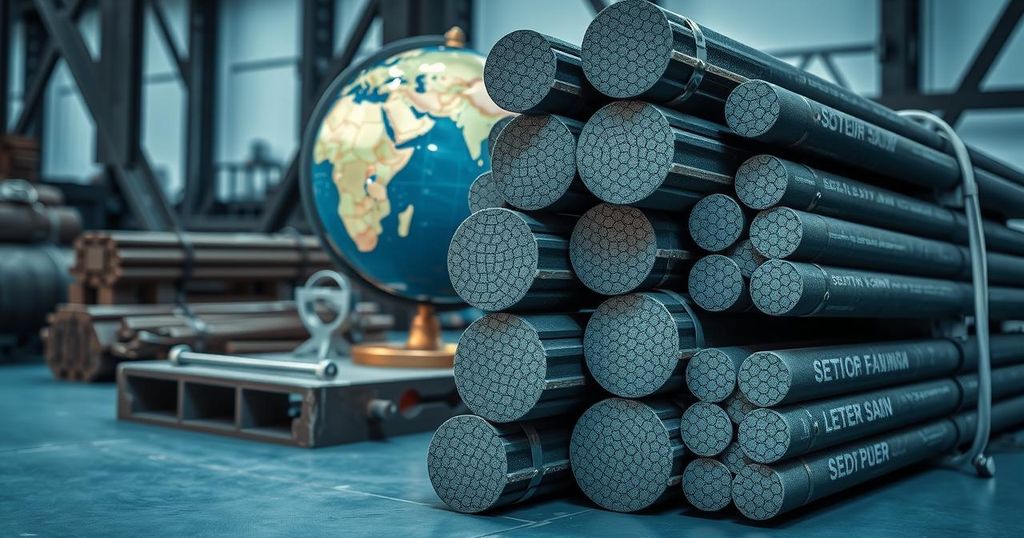Peru Investigates China’s Steel Dumping and Its Impact on Local Industry

China’s steel dumping threatens Latin America’s steel industry, prompting Peru’s Indecopi to investigate alleged dumping of steel products from China. Local manufacturers report significant declines in production and profitability. Indecopi aims to impose anti-dumping measures if required, while the broader implications of China’s trade practices challenge the region’s competitive stance in the global steel market.
China’s strategy of steel dumping has created a crisis in Latin America’s steel sector, severely impacting local markets and endangering jobs. In response to this influx of cheap steel and the ensuing unfair competition, various Latin American countries have enacted tariffs and anti-dumping measures. Peru’s National Institute for the Defense of Competition and the Protection of Intellectual Property (Indecopi) has specifically initiated investigations into Chinese dumping of hot-rolled carbon steel pipes, stainless steel sinks, and steel wire rods, following concerns raised by domestic manufacturers.
Peruvian manufacturers, including key players such as Manufactura de Metales y Aluminio Record S.A. and Corporación Aceros Arequipa S.A., have argued that these imports threaten national industries. Evidence shows that the imports of stainless steel sinks from China are particularly damaging, exhibiting a staggering dumping margin of 491.5 percent from July 2023 to June 2024. Sergio Cesarin, an academic expert, noted, “This percentage seems brutal to me.” The practice of dumping, which entails selling products significantly below their production cost, undermines local enterprises and threatens employment.
From January 2021 to June 2024, the production of stainless steel sinks in Peru fell by over 71 percent, with local sales declining by around 45 percent. Furthermore, these sinks were reportedly mispriced by more than 80 percent, adversely affecting domestic pricing structures. Additionally, as per Andina, productivity metrics have also deteriorated sharply, with production per worker plummeting by over 73 percent and profit margins dropping by 88 percentage points, leading to negative earnings in early 2024.
Indecopi has informed Chinese authorities about its investigations, which initially will span six months but may be extended to nine. The agency will conduct on-site evaluations to determine the extent of the dumping and its repercussions on local industries. If confirmed, anti-dumping measures may be enacted.
China has become the premier global steel producer, with its industry mostly state-owned, benefiting from unrestricted state financial support. As the centralized economy defies international trade norms, investigations by Dialogue Earth reveal that government subsidies often assist these competitive advantages. Cesarin underscored, “China is not only a dominant player in the steel industry but also faces accusations of underhanded practices such as dumping.”
Since 2010, China’s steel production was realigned towards international markets due to existing overcapacity, leading to predatory pricing strategies to secure market share. The Latin American steel industry, despite maintaining high standards, struggles against the artificially low prices of Chinese steel, especially in countries such as Peru that enjoy favorable trade agreements with China.
Countries like Mexico, Brazil, and Argentina have similarly faced threats from this competition, resulting in job losses and diminished industry presence. To mitigate these impacts, tariffs have been introduced on steel imports from China. According to Cesarin, responding to these imbalances necessitates negotiations not merely with businesses but also with the Chinese government, complicating the resolution process.
He concludes by emphasizing the importance of active government measures in Latin America, stating, “Despite the limitations impelled by the trade relationship with China, governments must take stronger actions to counteract the effects of Chinese steel, with Peru demonstrating a commitment to protect its domestic industry and jobs.
Overall, the Peruvian government is called to prioritize fair trade practices to safeguard its manufacturing sector from the adverse impacts of foreign dumping.
In conclusion, Peru’s investigation into China’s steel dumping reflects the broader challenges facing Latin America’s steel industry due to unfair pricing practices. The findings indicate significant damage to local production and employment, compelling regional nations to adopt protective tariffs. The continuing dialogue between Peru and China highlights the complexities of international trade relations, necessitating a firm commitment from the Peruvian government to defend its domestic industries and create equitable trade frameworks.
Original Source: dialogo-americas.com








